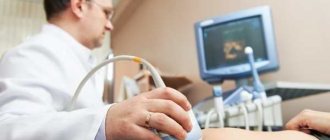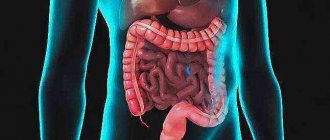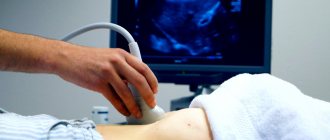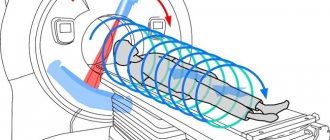A pregnant woman is required to visit a doctor every three months. During pregnancy, the expectant mother's body is subjected to significant stress. This can cause diseases of the internal organs. If certain symptoms are present, the doctor prescribes an abdominal ultrasound during pregnancy. The procedure is safe, but requires preparation before it is performed.
Pregnant women need to visit a doctor regularly
What is ultrasound
Ultrasound is a procedure for assessing the condition of a woman’s organs during pregnancy. The method is based on the analysis of ultrasonic waves transmitted and received by a special sensor. Using them, the doctor can evaluate the color, structure, evenness of the contours of a certain organ.
An ultrasound machine is valuable because it makes it possible to see organs and evaluate their functioning non-invasively. This is the safest way for the expectant mother to examine the internal organs, unlike an X-ray or CT scan.
However, the method has its drawbacks, which a pregnant girl needs to take into account:
- the accuracy of the results depends on the stage of pregnancy;
- the correctness of the diagnosis depends on the competence of the doctor;
- You cannot get advice from other specialists.
The ultrasound procedure is performed using a special device
How to prepare for the procedure?
The patient does not need to prepare for the procedure or prescribe a special diet.
Recommendations for preparing for an ultrasound examination of the thyroid gland relate to:
- medicines;
- eating;
- clothes;
- analyses.
On an empty stomach or not?
There is no need to fast or start the thyroid ultrasound procedure on an empty stomach. You can eat anything, but overeating is not recommended.
The main limitations are not related to the technique, but to the individual characteristics of the body. The examination is performed with a special sensor, which is used to press on the area near the thyroid gland. Such an effect on the patient’s organ can provoke a gag reflex.
To avoid unpleasant consequences, it is advisable for elderly people, pregnant women and children to limit the amount of food they eat or not eat 3-4 hours before the procedure.
Cloth
There are no special wardrobe recommendations - when going to the doctor, it is better to take clothes that do not restrict movement. It should allow you to lie down on the couch and tilt your head back slightly during the ultrasound.
Clothing should not cover the neck and interfere with diagnostic studies. Otherwise, the doctor may ask you to undress to the waist. Before the ultrasound, you will need to remove beads, earrings and chains.
Analyzes
Before an ultrasound examination of the thyroid gland, special tests are performed only as prescribed by a doctor. If there are blood test results for the amount of hormones, it is recommended to show them to the doctor.
What to take with you?
The list of materials required for diagnostics is determined by the medical institution. If no instructions were given on his part, when going for an ultrasound, they take a standard kit with them.
To perform an ultrasound of the thyroid gland, you need a soft paper napkin to remove traces of contact gel from the skin. It is also recommended to take shoe covers to cover your shoes.
The video shows how an ultrasound of the thyroid gland is performed. Filmed by Zalimkhan Magomedov.
What should you not do before the test?
Before the study you cannot:
- Take iodine-containing and hormonal medications for several days.
- Smoking. This is due to the ability of smoking to provoke an enlargement of the thyroid gland, which interferes with obtaining reliable results.
- Drinking alcohol. Despite the fact that under the influence of alcohol the blood vessels narrow, it will not affect the reliability of the results. The rule prohibiting alcohol is associated with the aesthetic side of the process.
- Subject the body to excessive physical stress.
- Worry (it’s better to take a mild sedative the day before).
When is ultrasound indicated during pregnancy?
The main symptoms for which a doctor may refer a pregnant woman for an ultrasound include:
- Severe abdominal pain. This is a dangerous symptom. It can signal both serious organ pathology and problems with pregnancy. You need to immediately contact a specialist and undergo a comprehensive examination. The safest option for a pregnant woman is an ultrasound.
- Epigastric pain. Most often, this symptom in pregnant women indicates inflammation of the gastric mucosa or malfunction of the liver.
- Abdominal injuries. While waiting for a new addition to the family, a woman needs to be especially careful and protect herself from mechanical injuries. If damage occurs, you should immediately do an ultrasound to examine the condition of the internal organs and the fetus.
- Presence of edema. Such symptoms indicate poor functioning of the organs of the excretory system; there may be processes of inflammation in the excretory organs. Sometimes edema indicates heart pathologies.
Any swelling is dangerous during pregnancy; it can harm the health of the embryo.
- Poor urine and stool tests. If the biomaterial contains an increased number of leukocytes, erythrocytes, bilirubin, and protein, it is necessary to conduct an examination of the organs. Quantitative and qualitative changes in excretory products indicate deviations in the functioning of the body.
Ultrasound is indicated if test results differ from the norm
- Hormonal imbalance. Endocrine disorders during pregnancy are dangerous and can cause serious harm not only to the mother, but also to the child.
- Lower back pain. This is a signal of inflammation of the reproductive or excretory organs.
- The presence of uncharacteristic discharge on underwear. The presence of blood, green discharge with a bad smell, white discharge similar to grains of cottage cheese, indicate the presence of an inflammatory process in the organs of a pregnant woman. If left untreated, they can cause pregnancy failure.
- Past flu, colds, infectious diseases. After suffering from these diseases, it is necessary to perform an ultrasound of the abdomen for pregnant women in order to exclude genetic deformities of the fetus and complications in other organs. Such diseases are especially dangerous in the early stages of pregnancy.
- Women over 35 years old. After 35 years, the level of hormones in a woman’s body decreases. The likelihood of a baby being born with deformities increases. To exclude this, it is necessary to periodically perform an ultrasound of the abdomen to exclude the development of serious diseases in the mother and genetic mutations in the fetus.
If the patient has had the flu, the doctor may also prescribe an ultrasound
Why do ultrasound examinations and what is its importance?
At the first signs of fertilization, the girl should contact the antenatal clinic to confirm her status and register. After all, medical supervision is very important during this period. For various reasons, pregnancy may not be confirmed: the test may show false data, or the cycle may simply go wrong for any other reason. The doctor, after examination, will confirm or deny this fact, but the presence of a fetus will definitely be shown by the first ultrasound procedure.
Why is it important to carry out this procedure after a delay? Let's look at the reasons in more detail:
- In case of prolonged absence of menstruation, it is possible to find out the true cause of the pathology if fertilization is not confirmed. After all, such a development of events can signal the development of a gynecological disease.
- In the early stages, pregnancy can be determined using ultrasound.
- Using an ultrasound, you can check whether the fetus is well attached, then assess its condition and rule out the development of any kind of anomalies.
- The procedure allows you to detect an ectopic pregnancy and protect the woman from the risk of harm to her health and life.
- Ultrasound examination is the only reliable source with which you can see fetal fading or a failed miscarriage.
- An ultrasound can save the child by showing in advance the threat of miscarriage due to increased tone or another reason. The doctor will prescribe the necessary therapy in a timely manner.
Is preparation necessary?
A pregnant woman needs preparation before an ultrasound. It includes:
- Follow the diet for several days. Before carrying out this procedure, you need to adhere to a diet for 2-3 days. All foods that contribute to flatulence should be removed from the diet.
- Reception of sorbents. They help free the digestive organs from slagging and make the ultrasound process more reliable.
- 5-6 hours before the procedure, stop eating and drinking. This is necessary so that the internal organs are “clean” so that the doctor can obtain reliable information about the state of the pregnant woman’s body.
Before the ultrasound you need to take a sorbent
Where to do it and how much it costs
An abdominal ultrasound can be done for pregnant women in a public clinic and in a private medical center that provides paid services. In the first case, a gynecologist or general practitioner is referred for testing. Diagnostics are provided free of charge at the clinic.
When the procedure is performed in a private center, the price of the study will depend on the number of organs examined. The cost of comprehensive diagnostics starts from 1,500 rubles. The price for viewing one organ is 400-600 rubles.
What deviations are detected
When examining the peritoneal area of a woman expecting a child, the following ailments and pathologies are most often detected:
- Pyelonephritis and cystitis. Poor urine tests are often confirmed by the presence of an inflammatory process in the excretory system. It can appear due to dietary abuse, severe stress on the kidneys when expecting a baby.
- Liver inflammation and cholecystitis. The body of the expectant mother works for two. The load on all internal organs increases. The liver and gall bladder may not cope, especially if the pregnant woman has a history of diseases of these organs.
Ultrasound is performed in the presence of cholecystitis
- Gastritis, dysbacteriosis. It often occurs in women in the last stages of pregnancy due to mechanical compression of internal organs.
- Oncology. During pregnancy, oncological processes rarely occur in the body, but this phenomenon does occur. Therefore, if there are certain suspicions, it is necessary to see a specialist and undergo an ultrasound procedure.
- Various fetal pathologies. The procedure for examining the abdominal organs is mandatory at the beginning of pregnancy for any woman in order to exclude the presence of genetic deformities in the baby.
- Inflammatory processes in the genital organs. The main indicator of serious problems with pregnancy is the presence of bloody discharge in your underwear. This could be placental abruption, threat of miscarriage, inflammatory processes, etc.
Can a doctor make a mistake?
It is possible to see pregnancy in the early stages, but sometimes an inexperienced diagnostician can confuse it with a hematoma or other neoplasm. Determining the gestational age or sex of the child can be erroneous. The reasons for this are the following:
- short period of time;
- the presence of hematomas and other formations;
- old, poorly functioning equipment;
- non-professional physician conducting research.
Error cases are quite rare. Almost always, ultrasound can detect the presence of a fetus. How many days later can the procedure be repeated? A specialist will inform you about this at your appointment.
At what stage will an ultrasound show pregnancy? The first planned procedure is carried out at the 10th week of the interesting situation of the fairer sex. But the fertilized egg can be seen after 5 days of absence of menstruation. What kind of ultrasound is done to detect conception? The most accurate method is transvaginal, but it is carried out only in the absence of contraindications.
When ultrasound is contraindicated
The procedure has no contraindications, however, the following may interfere with its implementation:
- allergy to ultrasound gel;
- rash and injuries on the epidermis;
- obesity;
- severe abdominal pain.
Possible complications are indicated in the table.
| Disorders often detected during abdominal ultrasound in pregnant women, % | Main disorders during pregnancy | |||
| pyelonephritis | gastritis and dysbacteriosis | genetic pathologies | liver inflammation | |
| 35 | 29 | 23 | 13 | |











